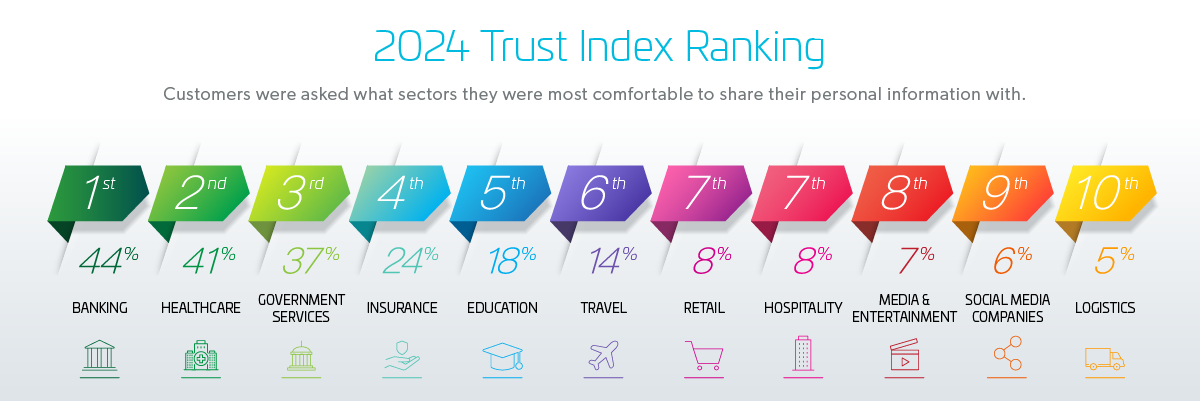In today's rapidly evolving digital world, the balance between a seamless online experience and robust data security is more critical than ever. The 2024 Thales Digital Trust Index sheds light on this delicate balance, revealing compelling insights into consumer and employee perspectives on digital trust and experience. This article explores these insights, guiding businesses toward building more robust, trust-based customer relationships.
Consumer Expectations
Privacy Rights and Seamless Online Experiences
An overwhelming 87% of consumers expect privacy rights from online interactions, with the most significant expectations being the right to be informed about data collection (55%) and the right to data erasure (53%). Additionally, the frustration with intrusive advertising (71%), cumbersome password resets (64%), and repetitive data entry (64%) indicate a growing demand for smoother digital experiences.
The Rising Demand for Transparent and Ethical AI Use
Consumer skepticism towards AI in digital interactions is increasingly evident. The study reveals that a significant portion of users, about 43%, are wary of AI-powered interactions, and nearly half (47%) question the responsible use of generative AI by companies. This apprehension highlights the need for transparency and ethical practices in AI applications.
As consumers become more aware of AI's potential implications, the demand for companies to demonstrate responsible and understandable AI integration grows. It's not just about adopting AI technology; it’s about earning trust through clarity and accountability in its application, ensuring that AI advancements are balanced with strong ethical standards and respect for user privacy.
Employee Digital Experience: A Workplace Productivity must-have
Although digital transformation is paramount in the current era, the Thales Digital Trust Index reveals a startling disconnect in workplace digital experiences. Only about half of the employees (51%) believe their employers value their digital experience. This gap in perception is not just a minor inconvenience but a significant barrier to workplace efficiency and satisfaction.
The frustration is particularly evident in mundane yet essential tasks such as password management. Nearly half of the workforce (48%) express annoyance with constant password resets, a seemingly trivial issue that can cumulatively lead to significant productivity losses. This is indicative of a broader problem in the digital workplace ecosystem. The need for frequent password creation reflects a considerable challenge in balancing security with user convenience. It is also an indication of the need to move away from insecure and burdensome passwords and into a passwordless era.
The report also highlights the struggle employees face in remote or hybrid work settings. Complex processes for accessing work accounts remotely are not just a source of irritation but also a deterrent to effective and efficient work. These findings underscore a pressing need for organizations to reassess their digital interfaces and authentication processes. By streamlining these experiences, companies can enhance employee satisfaction and drive greater productivity and engagement in the digital workplace.
Generative AI: Balancing Innovation with Privacy
The rise of Generative AI in enhancing digital experiences is met with mixed reactions. About half of the consumers (51%) appreciate its potential to improve online interactions. However, this enthusiasm is tempered by significant privacy concerns. A notable 57% of consumers express apprehension about the impact of generative AI on their data security.
This dichotomy, coupled with AI governance regulations being discussed by various governments, challenges companies to harness the benefits of AI innovations while ensuring responsible and secure usage. Companies must navigate this landscape carefully, prioritizing transparency and ethical considerations to maintain consumer trust in an AI-driven digital world.
Industry Trust Rankings: Banking Leads, Social Media Lags
The Thales Digital Trust Index delineates consumer trust across different sectors. Leading the trust index is the banking sector with 44%, followed closely by healthcare at 41% and government services at 37%. These industries, characterized by rigorous regulations and responsible data-handling practices, have earned higher consumer confidence.

At the bottom of the trust hierarchy are industries like media, entertainment, and social media companies. Only 6% of consumers trust social media companies, underscoring the skepticism around data privacy in less regulated sectors. This trend is also indicative of the misinformation threat, which damages public trust in media outlets and social media platforms.
This significant variance in trust levels across industries highlights the vital role that sector-specific data security and privacy measures play in shaping consumer trust. Businesses in lower-ranked sectors can learn from the highly regulated industries to improve consumer confidence and digital trust.
Building Digital Trust: Key Strategies for Businesses
To cultivate trust in the digital domain, businesses must adopt strategies that balance security, privacy, and user experience.
The following key strategies are essential:
- Leverage Risk-Based Authentication: Start at the very first point of user interaction with digital onboarding and employ risk-based authentication to reduce unnecessary friction for users, dynamically adjusting security measures based on the context of the user's actions.
- Implement Passwordless Authentication: Move towards passwordless authentication methods to enhance ease of use and eliminate common security vulnerabilities associated with traditional passwords.
- Adopt Progressive Profiling: Introduce progressive profiling to gather data incrementally. This approach ensures users are not overwhelmed by requests for information, making the process feel more natural and less intrusive.
The 2024 Thales Digital Trust Index underscores the intricate relationship between digital experience, privacy, and trust. In today's digital era, the onus is on businesses to prioritize robust security measures alongside seamless user experiences. By doing so, they can build and maintain consumer trust more effectively. Companies that understand and adapt to these dynamics can forge stronger, more trustworthy relationships with their customers and employees, ultimately enhancing their brand's credibility and consumer loyalty in the digital landscape.
Download the report here.

 Ammar Faheem | Director Product Marketing (CIAM)
Ammar Faheem | Director Product Marketing (CIAM)